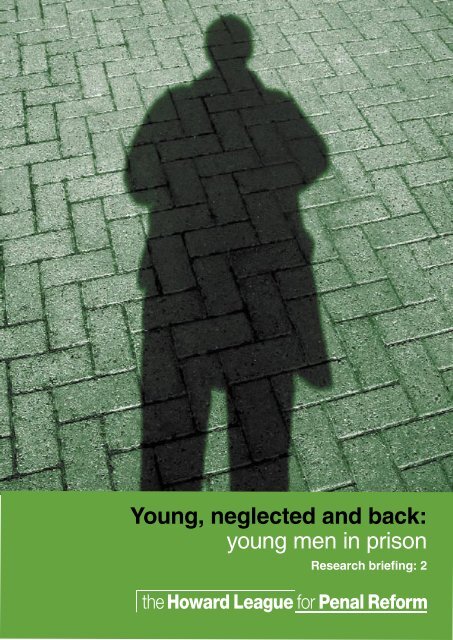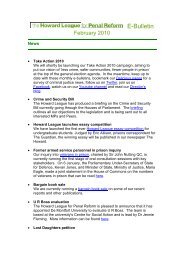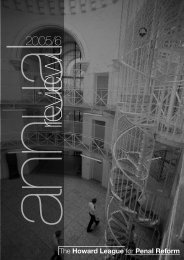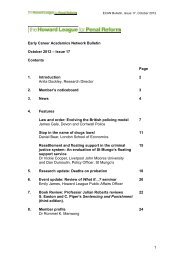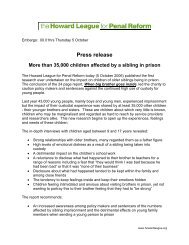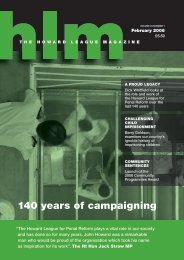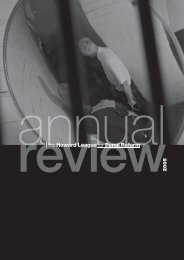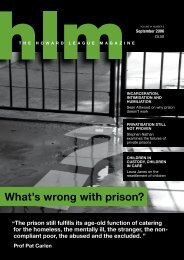Young, neglected and back: young men in prison - The Howard ...
Young, neglected and back: young men in prison - The Howard ...
Young, neglected and back: young men in prison - The Howard ...
- No tags were found...
You also want an ePaper? Increase the reach of your titles
YUMPU automatically turns print PDFs into web optimized ePapers that Google loves.
<strong>Young</strong>, <strong>neglected</strong> <strong>and</strong> <strong>back</strong>:<br />
<strong>young</strong> <strong>men</strong> <strong>in</strong> <strong>prison</strong><br />
Research brief<strong>in</strong>g: 2
<strong>Young</strong>, <strong>neglected</strong> <strong>and</strong> <strong>back</strong>: <strong>Young</strong> <strong>men</strong> <strong>in</strong> <strong>prison</strong><br />
“And course I’m stressed be<strong>in</strong>g <strong>in</strong> here. I’m not mak<strong>in</strong>g it up<br />
with my girlfriend, am I I’m not with my family. I’m not down<br />
the pub see<strong>in</strong>g my mates. I’m not work<strong>in</strong>g. I’m not mak<strong>in</strong>g<br />
money. I’m not sav<strong>in</strong>g noth<strong>in</strong>g. I’m not actually do<strong>in</strong>g<br />
anyth<strong>in</strong>g towards my future <strong>in</strong> the slightest by be<strong>in</strong>g here.<br />
That’s why I’m probably stressed.”<br />
(Michael, age 20)<br />
Introduction<br />
This paper exam<strong>in</strong>es the specific needs of <strong>young</strong> adult <strong>men</strong><br />
<strong>in</strong> <strong>prison</strong>. Focus <strong>and</strong> direction on <strong>young</strong> adults has largely<br />
been absent from recent develop<strong>men</strong>ts with<strong>in</strong> the crim<strong>in</strong>al justice<br />
system, despite the fact that s<strong>in</strong>ce 2000, the legislative apparatus<br />
has been <strong>in</strong> place to allow changes regard<strong>in</strong>g how <strong>young</strong><br />
adult offenders can be dealt with. Subsequently, abolition of the<br />
sentence of Detention <strong>in</strong> a <strong>Young</strong> Offenders Institution (DYOI)<br />
has not been enacted; therefore <strong>young</strong> adults have been left languish<strong>in</strong>g<br />
<strong>in</strong> a political <strong>and</strong> policy vacuum for over five years.<br />
This lack of strategic focus upon <strong>young</strong> people <strong>in</strong> <strong>prison</strong> has led<br />
to the current unacceptable situation. <strong>Young</strong> <strong>prison</strong>ers are <strong>in</strong> the<br />
unenviable position of be<strong>in</strong>g held <strong>in</strong> some of the most impoverished<br />
regimes with<strong>in</strong> the entire <strong>prison</strong> estate.<br />
As enact<strong>men</strong>t of abolition of DYOI is once aga<strong>in</strong> be<strong>in</strong>g mooted, the<br />
<strong>Howard</strong> League for Penal Reform believes that it is timely to consider<br />
how the needs of <strong>young</strong> adult offenders can best be met. Nearly 70%<br />
of <strong>young</strong> <strong>men</strong> who leave <strong>prison</strong> will be reconvicted with<strong>in</strong> two years<br />
of their release (RDS NOMS 2004). <strong>The</strong>refore, with<strong>in</strong> any one-year,<br />
at least 8,500 offences are committed by <strong>young</strong> adults who have<br />
been failed by the <strong>prison</strong> system. Im<strong>prison</strong><strong>men</strong>t fails to meet their<br />
needs, or effectively tackle reoffend<strong>in</strong>g. Many of these <strong>young</strong> people<br />
will end up <strong>back</strong> <strong>in</strong> <strong>prison</strong> on an <strong>in</strong>tractable journey from community<br />
to custody <strong>and</strong> <strong>back</strong> aga<strong>in</strong>. F<strong>in</strong>d<strong>in</strong>g alternative ways of work<strong>in</strong>g with<br />
<strong>young</strong> adult offenders, which reduce the risks of reoffend<strong>in</strong>g rather<br />
than exacerbat<strong>in</strong>g them, is necessary <strong>in</strong> creat<strong>in</strong>g safer <strong>and</strong> more<br />
confident communities.<br />
Out for Good<br />
This brief<strong>in</strong>g is based on emerg<strong>in</strong>g f<strong>in</strong>d<strong>in</strong>gs from the <strong>Howard</strong> League<br />
for Penal Reform’s research project Out for Good. This is a largescale<br />
research study <strong>in</strong>volv<strong>in</strong>g <strong>in</strong>-depth <strong>in</strong>terviews with 86 <strong>young</strong><br />
<strong>men</strong>, the majority of whom are serv<strong>in</strong>g short-term sentences of less<br />
than 12 months. <strong>The</strong> <strong>young</strong> <strong>men</strong> are provided the time <strong>and</strong> space to<br />
def<strong>in</strong>e <strong>and</strong> discuss their own resettle<strong>men</strong>t needs. All the <strong>young</strong> <strong>men</strong><br />
were <strong>in</strong>terviewed <strong>in</strong> the first few weeks after their arrival <strong>in</strong>to <strong>prison</strong>.<br />
Second <strong>in</strong>terviews were conducted with those still <strong>in</strong> <strong>prison</strong> at least<br />
two months after the <strong>in</strong>itial <strong>in</strong>terview. In total just under a quarter (20)<br />
were re-<strong>in</strong>terviewed at this po<strong>in</strong>t.<br />
An <strong>in</strong>tegral aspect of this research is to follow up each of the <strong>young</strong><br />
<strong>men</strong> <strong>in</strong> the community. This allows us to ascerta<strong>in</strong>: what impact<br />
im<strong>prison</strong><strong>men</strong>t has had upon them; what support they received from<br />
the <strong>prison</strong> <strong>and</strong> probation services <strong>and</strong> others <strong>in</strong> preparation for<br />
release; <strong>and</strong> whether their hopes <strong>and</strong> aspirations for life outside of<br />
the <strong>prison</strong> walls have been met. This part of the research is ongo<strong>in</strong>g.<br />
To date 15 <strong>in</strong>terviews have been conducted with <strong>young</strong> <strong>men</strong><br />
after their release, <strong>and</strong>, where appropriate their views have been<br />
<strong>in</strong>cluded <strong>in</strong> this report.<br />
<strong>The</strong> key characteristics of those <strong>in</strong>terviewed are:<br />
<strong>The</strong> average age was 19 years old.<br />
84 per cent identified themselves as white-British.<br />
<strong>The</strong> average sentence length was 10.5 months, although the range<br />
was from 4 weeks to 4 years.<br />
Identify<strong>in</strong>g needs<br />
<strong>The</strong> <strong>young</strong> adults <strong>in</strong>terviewed as part of the Out for Good research<br />
project have significant concerns <strong>in</strong>clud<strong>in</strong>g: <strong>men</strong>tal health problems,<br />
substance misuse problems, homelessness, disrupted family<br />
<strong>back</strong>grounds, lack of educational qualifications, unemploy<strong>men</strong>t or<br />
<strong>in</strong>volve<strong>men</strong>t <strong>in</strong> casual labour, <strong>and</strong> experience of care. <strong>The</strong> majority<br />
came from significantly disadvantaged communities where offend<strong>in</strong>g<br />
was endemic. Most had a family member who had been <strong>in</strong> <strong>prison</strong><br />
themselves. It is aga<strong>in</strong>st this <strong>back</strong>drop – of unambiguous social<br />
exclusion – that these <strong>young</strong> <strong>men</strong> spent the early years of their lives<br />
(Farrant, 2004). And, although officially now adults, their support<br />
needs rema<strong>in</strong> substantial.<br />
<strong>The</strong> years 18–21 mark a significant period of change <strong>in</strong> the lives of<br />
<strong>young</strong> people. How that transition is managed may have a marked<br />
effect on their future life chances. For <strong>young</strong> people <strong>in</strong> <strong>prison</strong>, what<br />
happens dur<strong>in</strong>g these crucial years of change may mean the difference<br />
between mak<strong>in</strong>g decisions which will improve their lives <strong>and</strong><br />
encourage them to turn away from crime; or alternatively, cont<strong>in</strong>u<strong>in</strong>g<br />
to offend <strong>and</strong> spend<strong>in</strong>g considerable parts of their adult lives <strong>in</strong><br />
<strong>and</strong> out of custody. It is imperative that all agencies <strong>in</strong>volved <strong>in</strong> deal<strong>in</strong>g<br />
with <strong>young</strong> adult offenders are clear about the specific needs of<br />
<strong>young</strong> adults, how they can be met, <strong>and</strong> what impact this will have<br />
on reoffend<strong>in</strong>g. This is <strong>in</strong> l<strong>in</strong>e with the stated aim of the new National<br />
Offender Manage<strong>men</strong>t Service (NOMS) which is ‘responsible for<br />
design<strong>in</strong>g <strong>in</strong>terventions <strong>and</strong> services for offenders that are designed<br />
to reduce reoffend<strong>in</strong>g <strong>and</strong> reconviction <strong>and</strong> protect the public.’<br />
Interim f<strong>in</strong>d<strong>in</strong>gs from Out for Good<br />
Nearly 1 <strong>in</strong> 5 <strong>young</strong> <strong>men</strong> reported that they were homeless at<br />
the po<strong>in</strong>t of their im<strong>prison</strong><strong>men</strong>t or as a result of be<strong>in</strong>g sent to<br />
<strong>prison</strong>.<br />
<strong>The</strong> number of reported previous convictions ranged from 0 to<br />
41, the average was just under eight previous convictions.<br />
60% had been <strong>in</strong> <strong>prison</strong> previously. On average they had been<br />
<strong>in</strong> <strong>prison</strong> on two previous occasions.<br />
Over half (54%) had not been <strong>in</strong> work prior to <strong>prison</strong>. 44% had<br />
been <strong>in</strong> some k<strong>in</strong>d of employ<strong>men</strong>t (be it casual, part time or<br />
full time). Only two of the 86 <strong>young</strong> <strong>men</strong> had been <strong>in</strong> full time<br />
education.<br />
<strong>The</strong> average age at which a first offence was committed was<br />
reported as be<strong>in</strong>g at 11 years old.<br />
<strong>The</strong> average age of those who had been <strong>in</strong> <strong>prison</strong> previously<br />
was reported as be<strong>in</strong>g 16 years old.<br />
40% had no qualifications at the time of <strong>in</strong>terview. 45% had<br />
a qualification ga<strong>in</strong>ed before <strong>prison</strong> <strong>and</strong> 15% had ga<strong>in</strong>ed a<br />
qualification whilst <strong>in</strong> <strong>prison</strong>.<br />
24% had been <strong>in</strong> some k<strong>in</strong>d of care.<br />
54% l<strong>in</strong>ked their offend<strong>in</strong>g to alcohol use.<br />
49% l<strong>in</strong>ked their offend<strong>in</strong>g to drug use.<br />
59% reported that they were aware that a family member was,<br />
or had been <strong>in</strong> <strong>prison</strong>.<br />
32% were fathers, had a pregnant partner or ex-partner.<br />
43% reported some k<strong>in</strong>d of <strong>men</strong>tal health need. 1 <strong>in</strong> 10<br />
reported that they self-harmed, felt suicidal, or had attempted<br />
suicide. 11% were on some form of medication, of which half<br />
were on anti-depressants.
<strong>Young</strong>, <strong>neglected</strong> <strong>and</strong> <strong>back</strong>: <strong>Young</strong> <strong>men</strong> <strong>in</strong> <strong>prison</strong><br />
<strong>The</strong> policy <strong>back</strong>ground<br />
<strong>Young</strong> adult <strong>prison</strong>ers are the forgotten <strong>and</strong> <strong>neglected</strong> section of the<br />
<strong>prison</strong> population (<strong>Howard</strong> League for Penal Reform, 2003). <strong>The</strong><br />
Crim<strong>in</strong>al Justice <strong>and</strong> Court Services Act 2000 abolished the sentence<br />
of Detention <strong>in</strong> a <strong>Young</strong> Offender Institution. A commit<strong>men</strong>t<br />
was made by the Govern<strong>men</strong>t not to imple<strong>men</strong>t the abolition until<br />
a Prison Service Order (PSO) had been issued. (Prison Service<br />
Orders provide detailed guidance to <strong>prison</strong> staff on how to imple<strong>men</strong>t<br />
policy). <strong>The</strong>re is some concern that, without any clear direction,<br />
<strong>and</strong> <strong>in</strong> order to cut costs, the implicit recognition of the needs of this<br />
age group will be lost. In 2000, the Govern<strong>men</strong>t said that prepar<strong>in</strong>g<br />
any such PSO would <strong>in</strong>volve ‘consultation with <strong>in</strong>terested bodies’.<br />
<strong>The</strong>refore, any adm<strong>in</strong>istrative changes that affect <strong>young</strong> adults<br />
should only be made follow<strong>in</strong>g extensive consultation.<br />
In 2001 the Govern<strong>men</strong>t’s manifesto stated that:<br />
“We will build on our youth justice reforms to improve the<br />
st<strong>and</strong>ard of custodial accommodation <strong>and</strong> offend<strong>in</strong>g behaviour<br />
programmes for 18–20 year old offenders.”<br />
(Labour Party Manifesto, 2001)<br />
However, the Labour Party Manifesto 2005 conta<strong>in</strong>ed no specific<br />
reference to the needs of this age group despite grow<strong>in</strong>g evidence<br />
that <strong>young</strong> adult <strong>prison</strong>ers have a raft of specific needs that are not<br />
be<strong>in</strong>g met. Follow<strong>in</strong>g years of neglect <strong>and</strong> with no strategic focus<br />
on <strong>young</strong> adults, simply transferr<strong>in</strong>g these <strong>young</strong> people <strong>in</strong>to an illprepared,<br />
<strong>and</strong> already overstretched adult <strong>prison</strong> estate is unlikely<br />
to meet their needs.<br />
<strong>The</strong> most recent annual report from the Chief Inspector of Prisons<br />
(2005) yet aga<strong>in</strong> raised concerns about the needs of <strong>young</strong> adults.<br />
<strong>The</strong>se <strong>in</strong>cluded:<br />
Reports that 32% of <strong>young</strong> adults had at some time felt unsafe<br />
whilst they were <strong>in</strong> <strong>prison</strong>.<br />
<strong>Young</strong> adults were mix<strong>in</strong>g with older <strong>prison</strong>ers.<br />
A lack of appropriate places for <strong>young</strong> adults, with many held <strong>in</strong><br />
<strong>prison</strong>s with multiple populations.<br />
<strong>Young</strong> adults were often held at a great distance from home; <strong>and</strong><br />
were liable to be moved between sites, at short notice <strong>and</strong> for short<br />
periods of time.<br />
Between 1994 <strong>and</strong> 2004 the number of <strong>young</strong> adult <strong>men</strong> <strong>in</strong> <strong>prison</strong><br />
rose by over 20% (Hansard, House of Lords written answer 7 April<br />
2005). Furthermore, over 20% of <strong>prison</strong>s hold just one <strong>young</strong> adult<br />
– a situation which is unlikely to make the <strong>young</strong> person feel safe,<br />
<strong>and</strong> where it is doubtful that adequate consideration of their age specific<br />
needs can be given (Hansard, House of Lords written answer<br />
7 April 2005).<br />
<strong>The</strong> Chief Inspector of Prisons concludes that <strong>young</strong> adults:<br />
“Still rema<strong>in</strong> some of the most overlooked <strong>and</strong> underresourced<br />
<strong>prison</strong>ers. Our reports record significant gaps<br />
between the provision for juveniles <strong>and</strong> <strong>young</strong> adults…<br />
Some establish<strong>men</strong>ts resembled transit camps, rather than<br />
effective <strong>young</strong> offender <strong>in</strong>stitutions…Bully<strong>in</strong>g is a particular<br />
concern for this age-group.”<br />
(HMCIP, 2005)<br />
<strong>The</strong> transition: childhood to adulthood<br />
<strong>Young</strong> people’s lives change rapidly <strong>and</strong> dramatically between the<br />
ages of 16 <strong>and</strong> 25 (Social Exclusion Unit, 2004). A move towards<br />
<strong>in</strong>dependence – the transition to adulthood – generally occurs at this<br />
time. Dur<strong>in</strong>g this transition, there is an <strong>in</strong>creas<strong>in</strong>g need to access<br />
services personally rather than through parents or carers. Moreover,<br />
dur<strong>in</strong>g this period of change there may be a greater need for<br />
services <strong>and</strong> other forms of <strong>in</strong>terventions to help support mak<strong>in</strong>g<br />
more <strong>in</strong>dependent decisions, many of which will affect the rest of a<br />
<strong>young</strong> person’s life.<br />
Seen as an important area of Govern<strong>men</strong>t policy, the Social Exclusion<br />
Unit (SEU) is currently undertak<strong>in</strong>g work on the transition from<br />
childhood to adulthood. Previous work by the SEU had shown that<br />
98% of <strong>young</strong> adults access<strong>in</strong>g services had more than one problem<br />
or need. <strong>Young</strong> adults who drop out of education, tra<strong>in</strong><strong>in</strong>g or<br />
work – or who drift <strong>in</strong>to crime – can face severe long-term personal,<br />
social <strong>and</strong> f<strong>in</strong>ancial consequences, as can their families (Social<br />
Exclusion Unit, 2005).<br />
<strong>Young</strong> people with severe or multiple needs – such as homelessness,<br />
substance misuse, offend<strong>in</strong>g or <strong>men</strong>tal health problems –<br />
need to access a range of services <strong>in</strong> order to address the various<br />
problems they have. But too often services approach someone’s<br />
problems as <strong>in</strong>dividual issues rather than look<strong>in</strong>g at them as <strong>in</strong>terrelated.<br />
As a result, <strong>in</strong>dividuals can f<strong>in</strong>d themselves on unpredictable<br />
<strong>and</strong> repetitive journeys around different agencies, or worse, on<br />
a downhill trajectory that further compounds their social exclusion<br />
(Social Exclusion Unit, 2005). <strong>The</strong> <strong>young</strong> <strong>men</strong> <strong>in</strong> this study had an<br />
array of needs that required some k<strong>in</strong>d of positive <strong>in</strong>tervention; all<br />
too often these needs were not met <strong>and</strong> resulted <strong>in</strong> a somewhat<br />
<strong>in</strong>evitable downward spiral <strong>in</strong>to offend<strong>in</strong>g <strong>and</strong> im<strong>prison</strong><strong>men</strong>t. One<br />
<strong>young</strong> man told us:<br />
“I was homeless… I got kicked out of home when I was 16<br />
<strong>and</strong> I was liv<strong>in</strong>g on my own from 16 until now, liv<strong>in</strong>g <strong>in</strong> all the<br />
different hostels <strong>and</strong> then I got a flat when I was 17 <strong>and</strong> all<br />
my mates would come round all the time <strong>and</strong> we turned it<br />
<strong>in</strong>to a party house <strong>and</strong> the police closed it down so I ended<br />
up be<strong>in</strong>g homeless aga<strong>in</strong>, lived with my gran for a week,<br />
<strong>and</strong> then I got sent <strong>in</strong> here.”<br />
(Jason, age 19)<br />
However, the SEU recognises that national policy makers have not<br />
placed sufficient weight on <strong>young</strong> people’s th<strong>in</strong>k<strong>in</strong>g <strong>and</strong> behaviour<br />
when they have designed policies aimed at them. <strong>The</strong>y conclude<br />
that ‘this oversight means that policy <strong>in</strong>terventions aimed at <strong>young</strong><br />
people risk fail<strong>in</strong>g’. It is essential that the views of <strong>young</strong> people are<br />
actively sought <strong>and</strong> used to <strong>in</strong>form policy decisions.<br />
From community to custody to community<br />
<strong>The</strong> unique aim of Out for Good is to provide the <strong>young</strong> <strong>men</strong> <strong>in</strong>terviewed<br />
the time <strong>and</strong> space to consider what they th<strong>in</strong>k would be<br />
funda<strong>men</strong>tal to their successful re<strong>in</strong>tegration <strong>in</strong>to society, provid<strong>in</strong>g<br />
them with the best opportunities to desist from crime. A variety<br />
of issues were <strong>men</strong>tioned rang<strong>in</strong>g from hav<strong>in</strong>g <strong>in</strong>dependent stable<br />
hous<strong>in</strong>g, to sett<strong>in</strong>g <strong>and</strong> achiev<strong>in</strong>g personal goals. <strong>The</strong> table below<br />
presents the resettle<strong>men</strong>t needs identified by the <strong>young</strong> <strong>men</strong> as<br />
necessary for their successful re<strong>in</strong>tegration.
<strong>Young</strong>, <strong>neglected</strong> <strong>and</strong> <strong>back</strong>: <strong>Young</strong> <strong>men</strong> <strong>in</strong> <strong>prison</strong><br />
Resettle<strong>men</strong>t need identified Percent of sample who<br />
referred to this need<br />
Ga<strong>in</strong><strong>in</strong>g employ<strong>men</strong>t 55<br />
Hav<strong>in</strong>g stable hous<strong>in</strong>g 26<br />
Stay<strong>in</strong>g with or gett<strong>in</strong>g a girlfriend 24<br />
Hav<strong>in</strong>g a child 20<br />
Positive family relations 20<br />
Control drug use 17<br />
Control alcohol use 15<br />
Ability to drive legally 12<br />
Set clear <strong>and</strong> achievable goals 12<br />
F<strong>in</strong>ancial security 9<br />
Stay<strong>in</strong>g away from peer group 9<br />
Mak<strong>in</strong>g better personal choices 7<br />
Stop gett<strong>in</strong>g <strong>in</strong>volved <strong>in</strong> violence 6<br />
Consider the impact of offend<strong>in</strong>g 3<br />
Move away from the area 3<br />
Go to college 3<br />
Previous convictions/orders annulled 2<br />
Access to appropriate help 1<br />
None 7<br />
One <strong>young</strong> man succ<strong>in</strong>ctly pulled some of these issues together<br />
when he expla<strong>in</strong>ed:<br />
“If I was to stop committ<strong>in</strong>g crime I’d need a job, a place to<br />
live <strong>and</strong> settle down with a girl. I know what I need to do; it’s<br />
just mak<strong>in</strong>g it happen.”<br />
(Daniel, age 20)<br />
Another <strong>young</strong> man thought that it would be far more useful if time<br />
spent <strong>in</strong> <strong>prison</strong> was used to ensure that <strong>prison</strong>ers ga<strong>in</strong>ed some form<br />
of qualification that would help them to get a job when they were<br />
released:<br />
“Everyone should come out of <strong>prison</strong> with a qualification,<br />
you’re not do<strong>in</strong>g anyth<strong>in</strong>g else whilst you’re <strong>in</strong> here, just sitt<strong>in</strong>g<br />
<strong>in</strong> a cell. But they [<strong>prison</strong> officers] don’t care. You might<br />
as well do someth<strong>in</strong>g that will get you a qualification so that<br />
when you go out you can go straight <strong>in</strong>to the workforce.<br />
Instead of like doss<strong>in</strong>g around try<strong>in</strong>g to sell some weed or<br />
someth<strong>in</strong>g, you’d have a qualification.”<br />
(Kurt, age 19)<br />
Interest<strong>in</strong>gly, three of the five most frequently <strong>men</strong>tioned issues<br />
related to personal <strong>and</strong> family relations. All too often the importance<br />
of family ties is seen as be<strong>in</strong>g of more relevance to wo<strong>men</strong> <strong>in</strong> <strong>prison</strong><br />
rather than <strong>young</strong> <strong>men</strong>.<br />
Separation from families, friends <strong>and</strong> partners caused a great deal<br />
of distress whilst the <strong>young</strong> <strong>men</strong> were <strong>in</strong> <strong>prison</strong>:<br />
“In a way…I’m still miss<strong>in</strong>g my family.”<br />
(Yas<strong>in</strong>, age 20)<br />
Additionally, f<strong>in</strong>d<strong>in</strong>gs from the Resettle<strong>men</strong>t Survey 2003 (Niven<br />
<strong>and</strong> Stewart, 2005) suggest that opportunities for <strong>in</strong>volv<strong>in</strong>g families<br />
<strong>and</strong> partners <strong>in</strong> the resettle<strong>men</strong>t of <strong>prison</strong>ers should be <strong>in</strong>creased.<br />
Unfortunately however, nearly a third of the <strong>young</strong> <strong>men</strong> <strong>in</strong> our sample<br />
did not receive any visits from their families whilst they were <strong>in</strong><br />
<strong>prison</strong>. In general, the <strong>young</strong> <strong>men</strong> said that it was their decision not<br />
to have visits, although whether this was or was not the case is difficult<br />
to determ<strong>in</strong>e.<br />
“I don’t want my family to come <strong>and</strong> visit me. Told my mum<br />
that. It’s not the sort of place I’d let my mum go. I wouldn’t<br />
want her <strong>in</strong> a place like this. It’s not that sort of place.”<br />
(James, age 19)<br />
Without adequate support, nor appropriate <strong>in</strong>terventions to meet the<br />
needs of <strong>young</strong> adults <strong>in</strong> <strong>prison</strong>, we risk high levels of reoffend<strong>in</strong>g,<br />
reconvictions <strong>and</strong> a return to <strong>prison</strong>.<br />
Conclusions<br />
Virtually all of the <strong>young</strong> <strong>men</strong> <strong>in</strong>terviewed as part of the <strong>Howard</strong><br />
League for Penal Reform’s Out for Good research project on the<br />
resettle<strong>men</strong>t needs of <strong>young</strong> adults <strong>in</strong> <strong>prison</strong> identified a range of<br />
complex issues that required some k<strong>in</strong>d of support or <strong>in</strong>tervention if<br />
they were to desist from further offend<strong>in</strong>g. Moreover, many of these<br />
needs can be related to the transition from childhood <strong>and</strong> youth<br />
<strong>in</strong>to adulthood. A number of the <strong>young</strong> <strong>men</strong> related this shift to their<br />
chang<strong>in</strong>g relationship to offend<strong>in</strong>g, often regard<strong>in</strong>g their <strong>in</strong>volve<strong>men</strong>t<br />
<strong>in</strong> crime as ‘kids stuff’ <strong>and</strong> someth<strong>in</strong>g they needed to stop <strong>in</strong> order to<br />
become ‘<strong>men</strong>’. Careful manage<strong>men</strong>t of this transition is crucial if real<br />
progress is to be made <strong>in</strong> reduc<strong>in</strong>g reoffend<strong>in</strong>g by <strong>young</strong> <strong>men</strong>.<br />
Im<strong>prison</strong><strong>in</strong>g <strong>young</strong> <strong>men</strong> at this critical stage <strong>in</strong> their lives can have a<br />
massively detri<strong>men</strong>tal effect upon their develop<strong>men</strong>t <strong>and</strong> their future<br />
life chances. Alternatives to custody should be sought <strong>in</strong> all possible<br />
cases. <strong>The</strong> crim<strong>in</strong>al justice system should <strong>in</strong>stead work to resolve<br />
conflict <strong>and</strong> repair harm. It should encourage offenders to acknowledge<br />
the impact of what they have done <strong>and</strong> give them an opportunity<br />
to make reparation. Those who have suffered harm should have<br />
this harm or loss acknowledged <strong>and</strong> a<strong>men</strong>ds made.<br />
Gender issues pervade both male <strong>and</strong> female <strong>prison</strong>s, yet most<br />
research fails to consider how gender impacts upon, <strong>and</strong> frames<br />
the male experience of im<strong>prison</strong><strong>men</strong>t. Nonetheless some research<br />
has started to recognise the importance of gender <strong>and</strong> it has<br />
been suggested that <strong>prison</strong>s harbour a ‘hypermascul<strong>in</strong>e’ culture<br />
(Jewkes, 2005). It is unsurpris<strong>in</strong>g then that a noxious mix of violence<br />
<strong>and</strong> <strong>in</strong>timidation can be found <strong>in</strong> many <strong>in</strong>stitutions that hold <strong>young</strong><br />
<strong>men</strong>. <strong>The</strong> <strong>young</strong> <strong>men</strong> themselves appear to recognise the dangers<br />
of such a culture, <strong>and</strong> identify their families, partners <strong>and</strong> the creation<br />
of new family units as crucial to their successful resettle<strong>men</strong>t.<br />
“Well, you know it’s my girlfriend who’s keep<strong>in</strong>g me out of<br />
trouble, she doesn’t use drugs <strong>and</strong> that, so I have to stay<br />
away from them when I’m at hers or she’ll go <strong>men</strong>tal.”<br />
(Craig, age 18)
<strong>Young</strong>, <strong>neglected</strong> <strong>and</strong> <strong>back</strong>: <strong>Young</strong> <strong>men</strong> <strong>in</strong> <strong>prison</strong><br />
Recom<strong>men</strong>dations<br />
In all possible cases, effective community <strong>in</strong>terventions should<br />
be sought for <strong>young</strong> adult offenders. All stakeholders must<br />
recognise that im<strong>prison</strong><strong>men</strong>t, even for a short period of time,<br />
ruptures lives <strong>and</strong> the damage is often irreparable. Contact<br />
with families <strong>and</strong> friends is made difficult; employ<strong>men</strong>t<br />
<strong>and</strong> hous<strong>in</strong>g, both key <strong>in</strong> reduc<strong>in</strong>g reoffend<strong>in</strong>g, may be lost,<br />
<strong>and</strong> health, both physical <strong>and</strong> <strong>men</strong>tal, may be detri<strong>men</strong>tally<br />
affected.<br />
<strong>Young</strong> adults have a range of specific needs that will not be<br />
met if they are ma<strong>in</strong>streamed <strong>in</strong>to the adult <strong>prison</strong> system.<br />
Any <strong>young</strong> adult who is held with<strong>in</strong> the <strong>prison</strong> system should<br />
have their needs identified <strong>and</strong> met tak<strong>in</strong>g <strong>in</strong>to account their<br />
age <strong>and</strong> vulnerability.<br />
<strong>The</strong> Rehabilitation of Offenders Act 1974 needs to be<br />
a<strong>men</strong>ded to recognise that hav<strong>in</strong>g an unspent conviction<br />
causes considerable problems to ex-offenders <strong>in</strong> relation<br />
to their employ<strong>men</strong>t prospects – a situation which is compounded<br />
when the offender is <strong>young</strong> <strong>and</strong> may therefore face<br />
difficulties <strong>in</strong> ga<strong>in</strong><strong>in</strong>g any work experience.<br />
Many <strong>young</strong> <strong>prison</strong>ers suffer from a lack of a supportive adult.<br />
With the develop<strong>men</strong>t of NOMS, consideration should be<br />
given to ensur<strong>in</strong>g <strong>young</strong> offenders have a positive <strong>and</strong> supportive<br />
adult <strong>in</strong> their lives.<br />
Family ties are important <strong>in</strong> facilitat<strong>in</strong>g access to services <strong>and</strong><br />
support to <strong>young</strong> <strong>prison</strong>ers. Nevertheless family relations may<br />
be fractious. Family mediation should therefore be available<br />
to all those who may benefit from such a service.<br />
References<br />
Farrant, F. (2004) A Sober<strong>in</strong>g Thought: <strong>Young</strong> <strong>men</strong> <strong>in</strong> <strong>prison</strong>. London:<br />
<strong>Howard</strong> League for Penal Reform.<br />
HMCIP (2005) Annual Report of HM Chief Inspector for Prisons Engl<strong>and</strong> <strong>and</strong><br />
Wales. London: TSO.<br />
Home Office (2002) Crim<strong>in</strong>al Statistics: Engl<strong>and</strong> <strong>and</strong> Wales 2001. London:<br />
Home Office.<br />
Home Office (2004) Population <strong>in</strong> Custody, Quarterly Brief October to<br />
December 2004. London: Home Office.<br />
Home Office (2004) Offender Manage<strong>men</strong>t Caseload Statistics, 2003.<br />
London: Home Office.<br />
<strong>Howard</strong> League for Penal Reform (2003) Busy Do<strong>in</strong>g Noth<strong>in</strong>g: <strong>Young</strong> <strong>men</strong> on<br />
rem<strong>and</strong>. London: <strong>Howard</strong> League for Penal Reform.<br />
Jewkes, Y. (2005) Men Beh<strong>in</strong>d Bars “Do<strong>in</strong>g” Mascul<strong>in</strong>ity as an Adaptation to<br />
Im<strong>prison</strong><strong>men</strong>t. Men <strong>and</strong> Mascul<strong>in</strong>ities 8 (1) 44–63.<br />
Metcalf H., Anderson T. <strong>and</strong> Rolfe H. (2001) Barriers to employ<strong>men</strong>t for<br />
offenders <strong>and</strong> ex-offenders. Leeds: CDS.<br />
Niven, S. <strong>and</strong> Stewart, D (2005) Resettle<strong>men</strong>t Outcomes on Release from<br />
Prison <strong>in</strong> 2003. London: Home Office.<br />
RDS NOMS (2004) Offender Manage<strong>men</strong>t Caseload Statistics, 2003.<br />
London: Home Office.<br />
S<strong>in</strong>gleton et al (2000) Psychiatric Morbidity among <strong>young</strong> offenders <strong>in</strong><br />
Engl<strong>and</strong> <strong>and</strong> Wales. London: Office for National Statistics.<br />
Social Exclusion Unit (2000) Report of Policy Action Team 12: <strong>Young</strong> People.<br />
London: ODPM.<br />
Social Exclusion Unit (2004) Break<strong>in</strong>g the Cycle: Tak<strong>in</strong>g Stock of Progress<br />
<strong>and</strong> Priorities for the Future. London: ODPM.<br />
Social Exclusion Unit (2005) Transitions – a Social Exclusion Unit <strong>in</strong>terim<br />
report on <strong>young</strong> adults. London: ODPM.<br />
Solomon, E (2004) A Lost Generation: the experiences of <strong>young</strong> people <strong>in</strong><br />
<strong>prison</strong>. London: Prison Reform Trust.<br />
Report written by F<strong>in</strong>ola Farrant<br />
Additional research: Rosie Meek<br />
1 Ardleigh Road, London N1 4HS<br />
Tel: 020 7249 7373 Fax: 020 7249 7788<br />
Email: <strong>in</strong>fo@howardleague.org Web: www.howardleague.org<br />
Registered charity number 251926<br />
Published 2005


